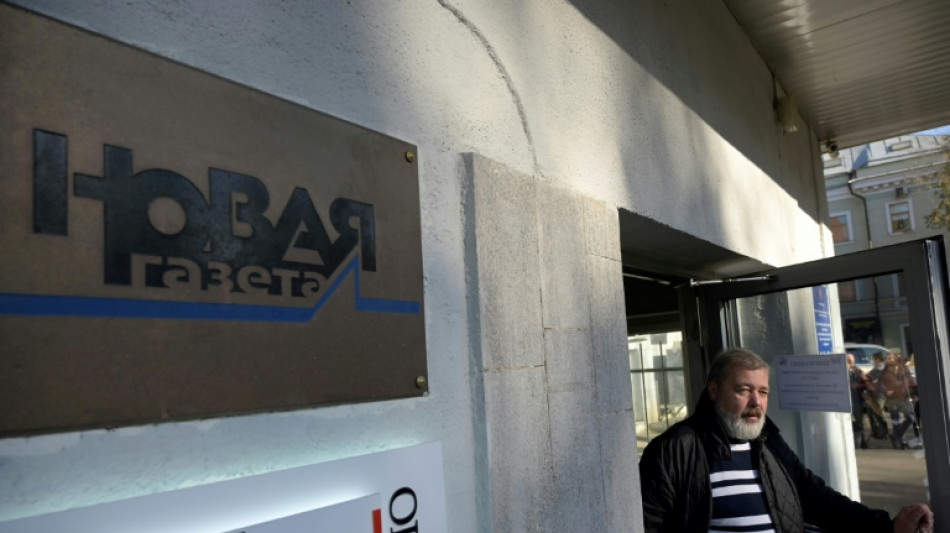
Russia revokes print licence of independent paper, jails ex-reporter for treason

Russian courts on Monday revoked the print licence of top independent newspaper Novaya Gazeta and jailed a respected ex-reporter for 22 years for treason, in the latest moves against the media and journalists.
Russian independent media have in recent years faced unprecedented pressure, with authorities further tightening the screws since the start of Moscow's February offensive in Ukraine.
All main independent media outlets have been shut down in Russia or suspended their domestic operations after a series of media restrictions were imposed on coverage of the Ukraine conflict.
A Moscow court "invalidated the registration certificate of the print version of Novaya Gazeta", the outlet, which suspended publication in late March, said on social media.
It later said the decision "killed" the newspaper.
"The newspaper was killed today. They stole 30 years of life from its employees. Deprived readers of the right to receive information," Novaya Gazeta said, adding that its "free spirit" will continue to exist.
UN Human Rights Office spokeswoman Ravina Shamdasani said the decision was "another blow to the independence of Russian media".
In a statement, the court confirmed the verdict which followed legal proceedings initiated by Russia's media watchdog Roskomnadzor.
The media regulator is also seeking to shut down Novaya Gazeta's website and a print magazine it launched in July.
Two court hearings are scheduled for later this month.
Monday's ruling came less than a week after the death of the last Soviet leader Mikhail Gorbachev, who helped in the founding of Novaya Gazeta in the early 1990s.
Novaya Gazeta chief editor Dmitry Muratov led the procession at Gorbachev's Moscow funeral on Saturday.
Novaya Gazeta has paid a heavy price for its independent stance and investigative coverage over the years.
Since 2000, six of its journalists and contributors have been killed in connection with their work, including top investigative reporter Anna Politkovskaya.
- Ex-reporter jailed for treason -
Also on Monday, a Moscow court jailed respected former defence reporter Ivan Safronov for 22 years on treason charges for divulging state secrets.
The judge said Safronov will serve the time in a "strict regime penal colony", AFP reported from court.
The 32-year-old worked for business newspapers Kommersant and Vedomosti and was one of Russia's most respected journalists covering defence, politics and the country's space programme.
Safronov appeared in court on Monday inside a glass cage for defendants wearing a grey tracksuit and black puffy vest, his hands in handcuffs.
Around a hundred people gathered in the Moscow courthouse for the verdict, applauding Safronov and chanting "Freedom!" after the sentence was read out.
Safronov smiled and shouted out "I love you!" before he was taken out of the courtroom, an AFP reporter saw.
His lawyer Dmitry Kachev said the verdict cannot be called "anything other than inadequate" and said Safronov was sentenced for his "journalistic work".
Safronov's lawyers told reporters that they will appeal the verdict.
Safronov was arrested in July 2020, after leaving journalism to serve as an adviser to the head of the state space agency.
He was accused of collecting confidential information about Russian military, defence and security and handing it over to foreign intelligence.
Safronov's case was heard behind closed doors based on evidence that was also kept secret.
Prosecutors last week requested a sentence of 24 years in jail for Safronov, after he reportedly turned down a plea deal for a shorter sentence.
At the start of his trial in April, Safronov called the case a "complete travesty of justice" and said he was not guilty.
The ex-journalist has said his reporting was based on analysis of open sources and conversations with officials.
Safronov's case triggered a backlash from independent journalists and his former colleagues.
On Monday, a dozen independent media, including Novaya Gazeta, published a statement demanding Safronov's release, saying the harsh sentence was "revenge" for his work.
W. Winogradow--BTZ

 London
London

 Manchester
Manchester
 Glasgow
Glasgow
 Dublin
Dublin
 Belfast
Belfast
 Washington
Washington
 Denver
Denver
 Atlanta
Atlanta
 Dallas
Dallas
 Houston Texas
Houston Texas
 New Orleans
New Orleans
 El Paso
El Paso
 Phoenix
Phoenix
 Los Angeles
Los Angeles



